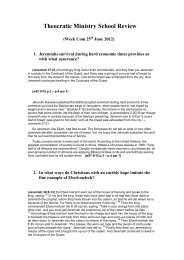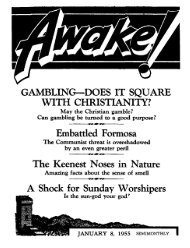1964 Awake! - Theocratic Collector.com
1964 Awake! - Theocratic Collector.com
1964 Awake! - Theocratic Collector.com
Create successful ePaper yourself
Turn your PDF publications into a flip-book with our unique Google optimized e-Paper software.
The Babylonians also held that life in<br />
Aralu was far more tolerable for some<br />
souls than for others and that soldiers<br />
fared better than the rest. This calls to<br />
mind a statement made by a Roman Cath·<br />
olic priest during the Korean War to the<br />
effect that soldiers dying on the battle·<br />
field did not need to go first to purgatory<br />
but went straight to heaven, for war was<br />
"part of God's plan for populating the king·<br />
dam of heaven.""<br />
What does the Bible say about this?<br />
Does it, too, teach that death is the door<br />
to "another kind of life"? Certainly not.<br />
lt clearly says: "As for the dead, they are<br />
conscious of nothing at all."-Eccl. 9:5.<br />
The Concept of Magic<br />
In the- minds of many persons the can·<br />
cept of consciousness after death or immor·<br />
tality of the soul is closely related to the<br />
practice of magic. It likewise may be said<br />
to be a religious concept that has devotees<br />
in all parts of the earth, being not at all<br />
limited to one race. To note an example,<br />
we find a Brazilian scholar writing about<br />
the situation in the state of Bahia, Brazil:<br />
"The number of whites, mulattoes and<br />
individuals of all colors or color grada·<br />
tions who, in their afflictions, in their trou·<br />
bles, consult the Negro fetisheers," either<br />
secretly or openly, "would be incalculable<br />
if it were not more simple to say that in<br />
general it is the mass of the population,<br />
except for a small minority."7 Africa, too,<br />
is filled with the religious use of magic,<br />
use of the juju being an example. Yes, in<br />
nearly every land the use of charms or<br />
talismans is prevalent.<br />
Here again, we find that Babylon had it<br />
first, for it is recognized as the very home<br />
of magic. "The popular beliefs of Europe<br />
in the Middle Ages," but by no means lim·<br />
ited to that time and place, "respecting<br />
evil spirits, exorcisms and charms and re-<br />
14<br />
garding witches and the characteristics of<br />
the Chief of the powers of evil, are simply<br />
survivals from the old Chaldean culture.<br />
Thus the Chaldean witch was believed to<br />
possess the power of flying through the<br />
air on a stick."B And for the average<br />
Babylonian "the priest was primarily the<br />
one who could drive evil demons out of<br />
the body, ... who could thwart the power<br />
of wizards and witches, who could ward<br />
off attacks of mischievous spirits, or who<br />
could prognosticate the future and determine<br />
the intention or will of the gods."1<br />
However, we see the greatest possible<br />
difference between the religion of the Bible<br />
and that of the Babylonians, for in the<br />
last book of the Pentateuch, Deuteronomy,<br />
we read: "There should not be found in<br />
you anyone who ... employs divination,<br />
a practicer of magic or anyone who looks<br />
for omens or a sorcerer, or one who binds<br />
others with a spell or anyone who consults<br />
a spirit medium or a professional foreteller<br />
of events or anyone who inquires of the<br />
dead." (Deut. 18:10, 11) As one authority<br />
on Babylonian religion observes, "there<br />
can be little doubt but that this Penta·<br />
teuchal opposition is aimed chiefly against<br />
Babylonian customs.""<br />
The Clergy-Laity Concept<br />
In most religions throughout the world<br />
today there is a distinction between the<br />
priests or clergy and the <strong>com</strong>mon people<br />
or laity. By means of titles and special<br />
garb the clergy are set apart because of<br />
their ordination and their special education<br />
and, oftentimes, their use of languages<br />
not understood by the people in general.<br />
Certain functions are the prerogatives of<br />
only the clergy, and this is true of the Roman<br />
Catholic clergy, the Protestant clergy<br />
and those not professing to be Christian,<br />
such as Buddhists and African fetish<br />
priests.<br />
AWAKE!




